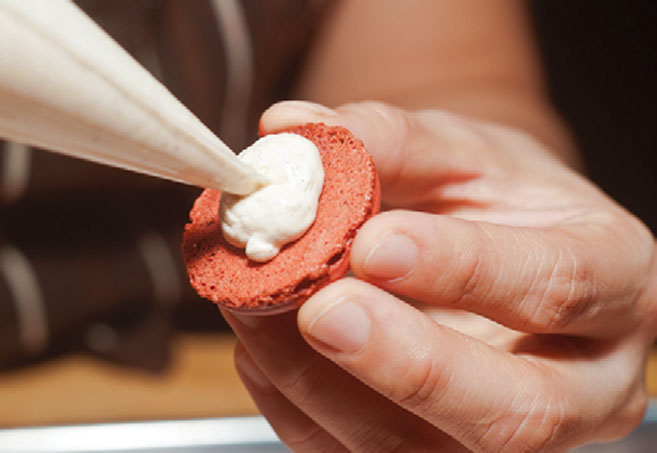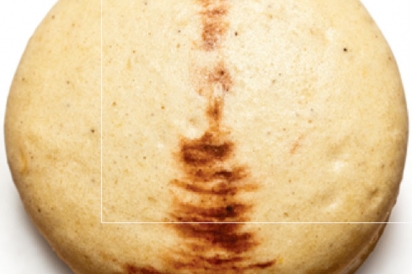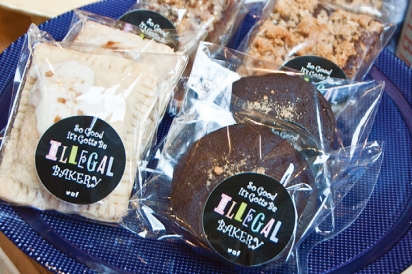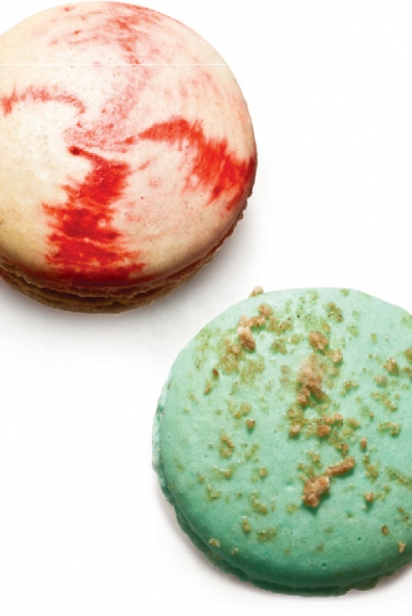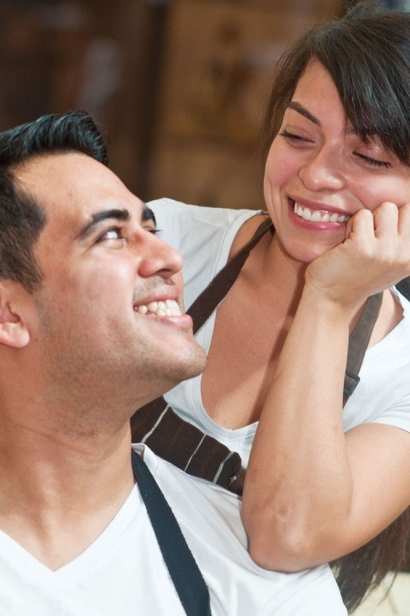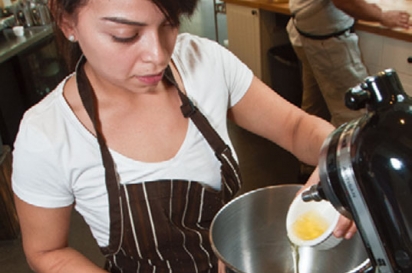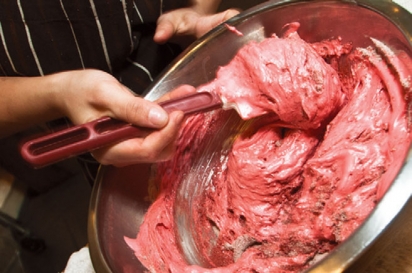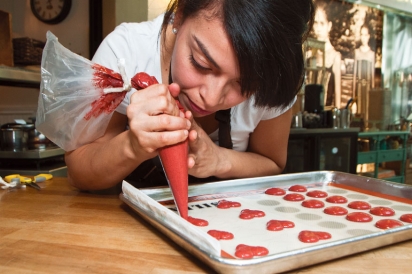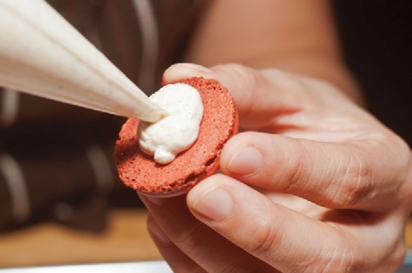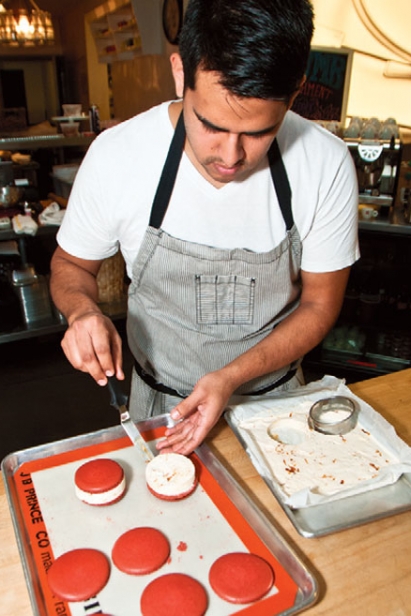Duo Does Dangerously Delicious Macarons at Illegal Bakery
BOLO: Brazen young bakers are on the loose, unleashing sweets on the unsuspecting public at farmers markets. Be warned -they're packing treat.
Meet the Bonnie and Clyde of baking. Mikey Mayta and Keily Vasquez of Illegal Bakery are committing a crime of passion – for exquisite baked goods, that is. Their tagline, “So good it’s gotta be Illegal,” tells you all you need to know about their delicate macarons, granola bars and other sweets.
SHADY BAKERS
Mayta, 28, and Vasquez, 27, partners in crime – uh, business – and sweethearts in real life, got to know each other while working at Michy’s, eventually bonding over baked goods. Mayta, who grew up in Miami, grew up baking with his mother. He went to culinary school at Johnson and Wales in Miami and Denver and spent a year working in hotels after getting his degree. When he returned to South Florida, he got jobs with chef Alberto Cabrera and then Michelle Bernstein, who impressed on him the importance of consistency and quality in the final product. “You had to execute her vision,” he recalls. “You always had to make sure you got the first dish right.”
Vasquez grew up in El Salvador, working in her family’s restaurant business. She came to Miami to visit her sister, a culinary arts student, met Mayta, and ended up staying. She got a job at Michy’s as a pantry cook and they started dating. Vasquez had no formal culinary training, but started baking when Mayta gave her a mixer as a gift, cooking up muffins and cupcakes. Then she fell in love with macarons, the delicate French almond-and-egg-white confections.
It took six months to get the recipe right. She experimented with French, Italian and Swiss recipes; tried baking on silicone baking mats and parchment paper; figured out how to handle the South Florida humidity; and learned about properly aging egg whites. In the meantime, Mayta was working his way through more restaurant kitchens, including the now-closed DRB and Proper Sausages, artisan butchers in Miami Shores.
PLOTTING THE CAPER
On their second anniversary as a couple, they went out and talked more about, well, food as a business. “We should bake,” he recalls them saying to one another. “No one was doing baking other than Cuban bakeries.” They decided to focus on creating childhood favorites, aimed at adults who “weren’t about to buy a whole box of Oreos” but craved quality baked goods. They’d create small-batch, home-baked treats to sell at farmers markets. They brainstormed on names – dismissing “Sweet Expressions” and other variations of “sweet” because they were already too common. Mayta decided their products would be “so good it ought to be illegal” – and a sassy business name was born for the partners in crime.
The pair found a designer to create their playful logo, started baking under Florida’s cottage industry law, and signed up for a booth at the farmers market at Pinecrest Gardens, debuting in 2013 in August, a slow time of year for South Florida markets. It did not go well. “It rained and flooded, and all our containers threatened to float away. They ended up canceling the market. We sold one thing that Sunday, a package of macarons,” he says. “But we were happy we got through it. We knew it wasn’t always going to be like that.”
GETTING AWAY WITH IT
Sales did improve, and the Illegal Bakery line expanded. When they weren’t working at their other jobs, she would bake colorful macarons, cornbread and scones. They created new recipes: the Inseedious bar, a gluten-free granola bar made with millet flour, dried fruits and carrots, pumpkin and sunflower seeds, flaxseed and quinoa; the Censorchip bar, dark chocolate, peanut butter, banana and coconut on a blondie base (and no egg); and Smoreos, sandwich cookies with marshmallow fluff and graham cracker crumbs. They expanded to other markets, including Miami Springs, Coconut Grove and the midweek market at the University of Miami, where they found a receptive audience in college students. “It’s the best age group,” Mayta says. “At UM we have kids who come every week,” adds Vasquez. “We know their names and what they want.”
Vasquez eventually left Michy’s to spend her time baking, while Mayta decided to devote his time building the business and working the social media. The pair did a pop-up at Taperia Raca, since closed, where they figured out how to manage their business and personal lives. “We learned patience and time management,” he says. “It was a growing experience for both of us.” Then came an Art Basel pop-up at the Miami Beach Botanical Garden, where they worked 130 hours in nine days – a grueling experience that nonetheless turned out to be a lot of fun.
Today, the Illegal bakers are looking at a busy year. They’ll be selling their wares at the Burger Beast’s Burgie Awards Jan. 31; participating in the South Beach Wine and Food Festival’s Whole Foods Market Grand Tasting Village on Feb. 22; providing Mexican-inspired desserts at Taquiza, a new taqueria in Miami Beach; and they’re talking with Kahwa Coffee Roasting about selling their product in their shops. The pair is now exploring a savory product, the kolache, a pastry with sweet and savory versions popular in U.S. Czech communities in Texas. “We’re using pickle-brined pork butt, mojo-smoked shoulder, Gruyere, a nice mustard in a challah-style fulled bun,” says Mayta.
It’s another taste to convince people to try, but Vasquez has learned the secret: “You do it with a smile.”
{ Making Macarons }
Mayta and Vasquez use the kitchen at Crumb on Parchment in Miami's Design District. They try to source locally when they can, buying strawberries from Homestead, tamarind from the Upper East Side market and bacon from Miami Smokers. Vasquez starts by beating egg whites.
Macarons range from $5-6 for a package of three. Bars are $4, Poptarts are $3-6, depending on the filling. Find them at farmers markets at Miami Springs and the University of Miami, and Cafe Curuba in Coral Gables.


